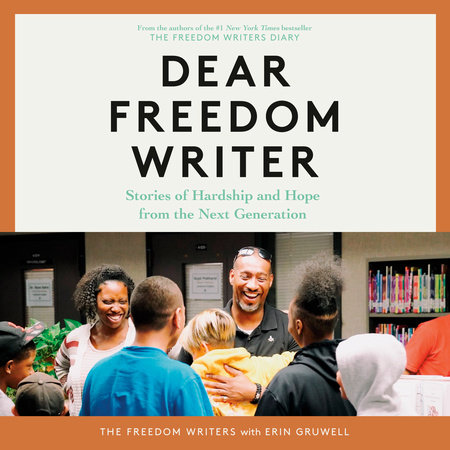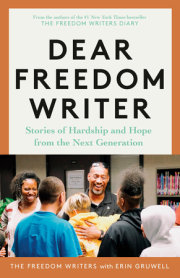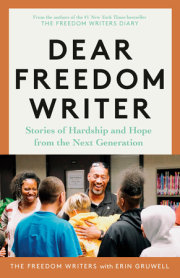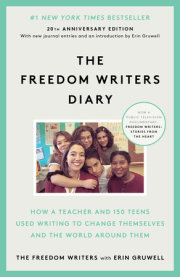Letter 1
A Royal Flush
Dear Freedom Writer,
Life was a struggle for me from day one. I was born prematurely and was fighting to survive. I never knew my “real” mom. My mom was schizophrenic and was a drug abuser. I was told I was born in a toilet in some sort of halfway house. Can you imagine being told that? Thinking about this makes me feel so sad—I know “sad” is a simple word, but it’s a powerful one. I do not feel that I was important to my parents, and to this day, the thought makes me feel completely insignificant. Learning that left me feeling deeply hurt, because my mom didn’t care where she had me or take the time to get the help she needed to make sure I was born safely. I was taken immediately from her when I was born and became a ward of the state. I ended up being placed where I had biological siblings, with a woman I came to call “Gramma.”
Looking back, there were times when I felt like my life wasn’t so bad, but I could not see much difference. I had heard the words “neglect,” “abuse,” and “drugs,” but I did not realize I was actually living in those conditions; I was too young to understand. Most of the time, I was just thankful I had a roof over my head, but now, looking back, I cannot believe how I lived and how I was treated. How could Child Protective Services place me from one bad situation to another?
No one in my family stepped up to try and give me the life I deserved. No one wanted me. I felt like no one in my family had true intentions to care for me, and no one fought for me. I was raised by a woman that I didn’t know. I now know that the system placed me in Gramma’s care because she was married to my deceased grandfather, but no one told me then.
She wasn’t always a gentle woman. I remember the day she told me that my mom had overdosed. I was only seven years old. She didn’t sugarcoat it. She explained the horrific situation to me in graphic detail: how my mother’s mail had piled up in the hall, and the awful smell of her body decomposing in the bathtub for weeks. These were details no seven-year-old needed to hear. When I cried, Gramma seemed irritated and said, “You didn’t even know her.”
That lack of compassion from Gramma during such a difficult time left me believing that my feelings didn’t matter, that they were minuscule. I was thankful for this woman, but she did not deserve to take care of me or my sister. She hit us when we misbehaved—with either her hand, a spoon, or anything that she could reach for. I can still remember the sound the spoon made as it hit my wrist. She was decent if there was nothing to stress about, which was rare.
Gramma had a son that was always in trouble and was a chronic drug user. He lived on the premises, and life was chaotic with him around. She was always scared of him—as was I! He ran a meth lab, and there were constantly strangers coming in and out of the house. I remember the odd smell from his trailer. We always had to walk on eggshells, as his temper and his paranoia were so unpredictable. I never knew how he would react and take it out on my sister and me. He did such horrible things—he called us names, he hit Gramma over the head with a vacuum, he turned off our power, he took our phones, and he blamed us for everything. Our survival was at the mercy of an unstable man. Once, he threatened to blow up the house, and he said he was going to put me “in the ground.” I lived this way for the first eleven years of my life. Every day, I woke up scared of this intimidating and abusive man. This crazy life stemmed from my mother’s initial drug abuse, and now I was living at the hands of another drug abuser.
“Neglect” can be interpreted differently by people. My experience of feeling neglected meant that Gramma didn’t care enough to monitor who I was with. She knew my sister and I were hanging out with bad people; she allowed these boys to spend the night right in our room. I started smoking marijuana when I was nine years old. I did other drugs as well. Even when she knew we were smoking, Gramma did not do anything about it. If I tried to do the right thing, like give Gramma my sister’s marijuana, I would be the one to get in trouble, and Gramma would just give the marijuana right back to her. I rarely went to school, and there wasn’t a consequence for that either. I felt neglected for this too. What about the teachers, who didn’t seem to care that I wasn’t in school? Why didn’t they help me to make this situation better? I guess most teenagers would like that; however, as a motherless child, I needed someone to teach me right from wrong. I needed rules and expectations set for me. Instead, I got a woman that let us live however we wanted, and because of this I made terribly reckless choices. She let me stay up all night and go wherever I wanted—at times she didn’t even know where I was.
I believed I wasn’t worthy of having anyone push me to make good choices. Gramma’s lack of attention made me feel worthless and empty; my interests didn’t matter. Once in a while, Gramma would threaten that social services would come to the house. To be honest, I hoped they would show up and somehow change my life for the better. I hoped they would help all of us because I really loved my Gramma.
My Gramma sent me to live with a family friend to avoid complications with CPS and the police. She didn’t want me to snitch on her for letting my twelve-year-old sister have sex or for knowing that her son forced Gramma to buy his pills online so he could make his meth. It was supposed to be temporary, but she never let me come back home. Even though the life she created for us was centered around neglect, she was all I had. After begging and pleading, I was able to see her one last time, though she was on her deathbed. She passed away without us ever having any closure.
So here I am, twelve years old, waiting for a complete stranger to come and pick me up. Once again, I’m a ward of the state.
So, I ask you, Freedom Writer, as someone born in a toilet, is my life always going to be this shitty?
Sincerely,
In Survival Mode
Response 1
A Royal Flush
Dear In Survival Mode,
You started your life at rock bottom, in a toilet of all places, so you rightly asked, “Can you imagine being told that?” Unimaginable. I was also born and later abandoned by my drug-addicted parents, and I was moved beyond words by your story. The only memory ever told to me about my childhood was when my siblings shared that I shampooed my hair in my own shit. I laughed, but underneath, like you, I felt shame and humiliation, unloved and unwanted, feelings that stayed with me for many years.
When I was your age, my father left our house in a violent rage, never to return. Shortly after, he settled in with his mistress. He tried to persuade me to leave my mother and siblings and move in with him by offering up a rules-free life by the beach, with anything money could buy, in a house filled with drugs and alcohol. Moving there would mean that I would have to abandon half of my family.
I wanted to stay in the middle ground and maintain relationships with both sides of my family, but I did not want to be separated from my siblings. I had no choice but to do what I thought was right and decline his offer. As a result, I was cast away by my father. I was not the only one my father had abandoned. He also stopped financially supporting my mother and let the family house get foreclosed on, leaving us broke and homeless. As if that wasn’t enough, he cut me off from everyone else on his side of the family, severing relationships with all who could have rescued me from this dire situation.
He broke the family even further apart by separating me from my two siblings, gaining custody of them in court. He neglected and abused them until they both ran away from him. This led me into a deep depression where I was unable to function, and I nearly dropped out of school. Eventually I got help and counseling, reconnected with my siblings, found a great support network in the Freedom Writers, and was able to put my life back together. It took many years to restore contact with my father’s side of the family, but I was able to be with my grandmother in the last few years before she passed. My father disappeared. We presume he passed away, so I will never be able to gain closure with him. But despite it all, I carried on, making a different and better life.
Your experiences with your abusive and neglectful family are tragic, and the bad memories can be terribly intrusive and take hard work to overcome. But you are finally free from that environment. Your feelings, contrary to what you were told, are important. And though it sounds like compassion, empathy, and understanding were not very often shared with you, you display these qualities in abundance. You were born beautiful and perfect, and what happened to you is no reflection on your true worth. Though the internalized pain and trauma of being abused and neglected at times leaves you feeling worthless, you are worthy beyond measure. Freedom Writers talk about the family we choose, and in doing so we make ourselves and the world anew! You are the comeback kid, and your courage and humanity will propel you toward great things! To be sure, not without struggle, and not without hardship. But forward nevertheless!
Copyright © 2022 by The Freedom Writers. All rights reserved. No part of this excerpt may be reproduced or reprinted without permission in writing from the publisher.









